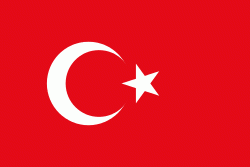Kalkan
Kalkan is a town on the Turkish Mediterranean coast, and an important tourist destination. The area includes historical sites (such as Tlos and Kekova) and fine beaches (including Patara Beach and Kaputaş Beach).
Kalkan is an old fishing town, and the only safe harbour between Kaş and Fethiye; it is known for its white-washed houses, descending to the sea, and its brightly coloured bougainvilleas. It averages 300 days of sunshine a year.
Until the early 1920s, nearly all of its inhabitants were Greeks and the town was called Kalamaki. They left in 1923 during the exchange of populations between Greece and Turkey after the Greco-Turkish War and emigrated mainly to Attica, where they founded the new town of Kalamaki. Abandoned Greek houses can still be seen at Kalkan.
Kalkan was an important harbour town until the 1970s as the only seaport for the environs. It declined after construction of Fethiye road but revived after the emergence of the tourism industry in the region.
Although part of the Antalya province administratively, Kalkan is connected more closely to Fethiye economically and for transportation.
The Independent listed Kalkan among the best tourist destinations for 2007. The paper recommended Kalkan especially for those seeking a romantic vacation and who do not want to travel far from their home country in Europe. According to a 2012 survey 96% of visitors to Kalkan during 2011 were from the United Kingdom.
* Kaputaş Beach
Kalkan is an old fishing town, and the only safe harbour between Kaş and Fethiye; it is known for its white-washed houses, descending to the sea, and its brightly coloured bougainvilleas. It averages 300 days of sunshine a year.
Until the early 1920s, nearly all of its inhabitants were Greeks and the town was called Kalamaki. They left in 1923 during the exchange of populations between Greece and Turkey after the Greco-Turkish War and emigrated mainly to Attica, where they founded the new town of Kalamaki. Abandoned Greek houses can still be seen at Kalkan.
Kalkan was an important harbour town until the 1970s as the only seaport for the environs. It declined after construction of Fethiye road but revived after the emergence of the tourism industry in the region.
Although part of the Antalya province administratively, Kalkan is connected more closely to Fethiye economically and for transportation.
The Independent listed Kalkan among the best tourist destinations for 2007. The paper recommended Kalkan especially for those seeking a romantic vacation and who do not want to travel far from their home country in Europe. According to a 2012 survey 96% of visitors to Kalkan during 2011 were from the United Kingdom.
* Kaputaş Beach
Map - Kalkan
Map
Country - Turkey
 |
|
| Flag of Turkey | |
One of the world's earliest permanently settled regions, present-day Turkey was home to important Neolithic sites like Göbekli Tepe, and was inhabited by ancient civilisations including the Hattians, Hittites, Anatolian peoples, Mycenaean Greeks, Persians and others. Following the conquests of Alexander the Great which started the Hellenistic period, most of the ancient regions in modern Turkey were culturally Hellenised, which continued during the Byzantine era. The Seljuk Turks began migrating in the 11th century, and the Sultanate of Rum ruled Anatolia until the Mongol invasion in 1243, when it disintegrated into small Turkish principalities. Beginning in the late 13th century, the Ottomans united the principalities and conquered the Balkans, and the Turkification of Anatolia increased during the Ottoman period. After Mehmed II conquered Constantinople (Istanbul) in 1453, Ottoman expansion continued under Selim I. During the reign of Suleiman the Magnificent, the Ottoman Empire became a global power. From the late 18th century onwards, the empire's power declined with a gradual loss of territories. Mahmud II started a period of modernisation in the early 19th century. The Young Turk Revolution of 1908 restricted the authority of the Sultan and restored the Ottoman Parliament after a 30-year suspension, ushering the empire into a multi-party period. The 1913 coup d'état put the country under the control of the Three Pashas, who facilitated the Empire's entry into World War I as part of the Central Powers in 1914. During the war, the Ottoman government committed genocides against its Armenian, Greek and Assyrian subjects. After its defeat in the war, the Ottoman Empire was partitioned.
Currency / Language
| ISO | Currency | Symbol | Significant figures |
|---|---|---|---|
| TRY | Turkish lira | ₺ | 2 |
| ISO | Language |
|---|---|
| AV | Avar language |
| AZ | Azerbaijani language |
| KU | Kurdish language |
| TR | Turkish language |















